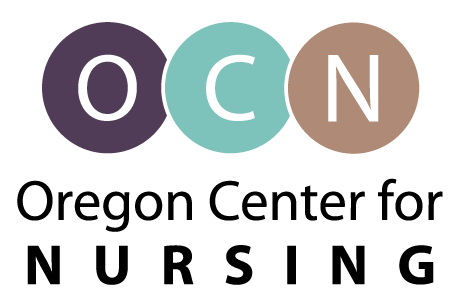Natalie Herb was halfway through her last semester of nursing school at George Fox University when she heard the news: Oregon’s first COVID-19 patient was being treated at Kaiser Westside in Hillsboro.
Immediately, Herb and her classmates began wondering how COVID was going to affect their schooling. “We were told, ‘trust us, we’ll get you to graduation,’” she recalls, “but two weeks later, everything changed. Clinicals were getting cancelled; people weren’t allowed to go onsite; senior capstone rotations were getting cancelled. A week later, classes were getting cancelled. It was terrifying.”
Herb’s experience reflects many Oregon nurse graduates’ experiences early last year. At that moment, their schools were, like everyone, trying to figure out how protect their staff, teachers, and students. And as with any fast-changing scenario, not everything the students feared turned out to be true.
At the root of everyone’s concern were “clinicals”—the nursing student’s hands-on experience—to which, as the pandemic’s realities became clear, schools provided a variety of alternatives. At George Fox, increased use of standardized patient actors gave them opportunities to practice diagnostic and soft skills; at OHSU, the students’ integrated practicum came to rely on virtual and in-person simulations as well as web visits, which were suddenly growing very popular.
“We had multiple contingencies in play,” says Pam Fifer, associate dean at George Fox’s College of Nursing, which eventually held classes in auditoriums with students masked and distanced. “Our commitment was to do as much face-to-face as possible.”
Yet even as schools instituted new protocols, students were worried. Isaac Thelin, a master’s nursing candidate in psychiatry at OHSU, remembers the moment he learned patient visits would be moving to telehealth. “In psychiatry, the therapeutic relationship is to the clinician as the scalpel is to the surgeon,” Thelin says. “Being in a room with someone is different.” He worried about establishing rapport with his patients via screen: How do I assess mental status? How do I take vitals?
Missing clinicals also meant missing the potential for getting a job. “Only one of my peers had secured a job after graduation,” Herb says. “My professors had been preparing me for interviews since January, but when I talked to potential employers, they were like, ‘hold off, we’re not available yet.’”
Across the state, employers were doing what they could to mitigate the situation. In Portland, at Willamette Health & Wellness, where Thelin was completing his clinical hours, staff had a created an onboarding plan and a preceptor willing to assist. “Isaac wasn’t just a student, he was part of our team,” says Nicole Bennett, the clinic’s co-director. “We include our entire system in decisions we make, and moved very deliberately. We didn’t do anything for him that we don’t do for any employee.”
OHSU’s Kristin Lutz says hospitals and healthcare organizations understand that students are getting educated during a different time. “They’re ready to help graduates in their transition to practice,” she says. “We tell them: ‘when you graduate, you’re expected to be a novice, not an expert.’”
“We teach our nurses to be flexible,” adds George Fox’s Fifer. “And they’ve gotten lots of experience demonstrating flexibility and resilience.”
For Herb, a job finally appeared where she had done her senior rotation: at the ER at OHSU Hillsboro. But she hadn’t stepped into a hospital for six months. “In school, you start to learn which diseases require which sets of PPE,” she says. “COVID is like the flu or other respiratory diseases, and I didn’t have a lot of experience with the PPE for COVID patients. I felt overwhelmed. But the hospital gave me lots of grace.”
The good news? Because of the pandemic, nursing schools now have a strong roster of creative teaching strategies that offer even deeper levels of clinical judgement and reasoning. And employers are working hard to help nurse graduates get up to speed. “COVID is awful,” Fifer says, “but good things have come from it.”
As a freshly minted RN, Herb is settling into to her new job. “I was fortunate to get hired where I did my senior capstone—I had seven weeks of practice here as a student nurse,” she says. She’s seeking to fill the gaps she might still have. “Nurses like me are described as life-long learners,” she explains, “and part of that is continuing to look for opportunities to learn.” For the new RN and many of her peers, one huge opportunity—in viral form—arrived in Oregon just over a year ago.
OCN is a nonprofit organization created by nursing leaders in 2002. OCN facilitates research and collaboration for Oregon’s nursing workforce to support informed, well-prepared, diverse and exceptional nursing professionals. Recognized by the Oregon state legislature as a state advisor for nursing workforce issues, OCN fulfills its mission through nurse workforce research, building partnerships, and promoting nursing and healthcare.
